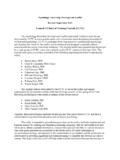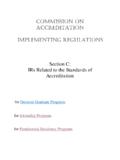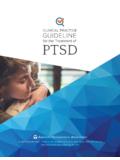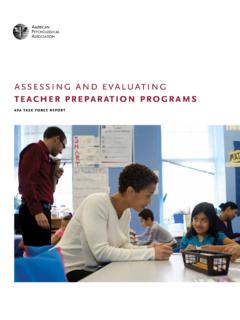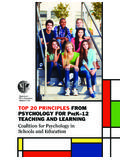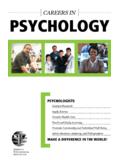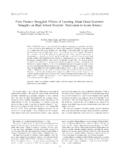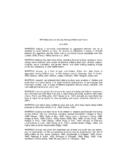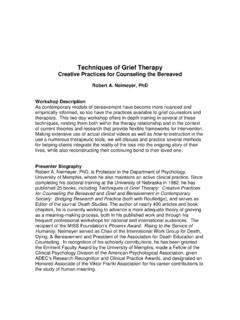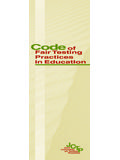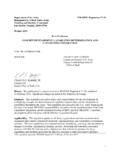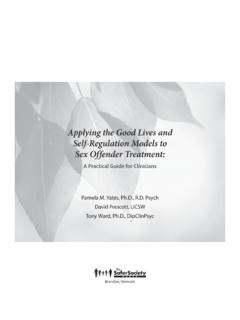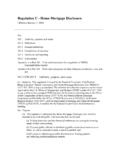Transcription of Childhood Self-Regulation as a Mechanism …
1 Childhood Self-Regulation as a Mechanism Through Which EarlyOvercontrolling Parenting Is Associated With Adjustmentin PreadolescenceNicole B. PerryUniversity of Minnesota, Twin CitiesJessica M. Dollar, Susan D. Calkins,and Susan P. KeaneUniversity of North Carolina at GreensboroLilly ShanahanThe University of Z richWe examined longitudinal associations across an 8-year time span between overcontrolling parentingduring toddlerhood, Self-Regulation during early Childhood , and social, emotional, and academic adjust-ment in preadolescence (N 422). Overcontrolling parenting, emotion regulation (ER), and inhibitorycontrol (IC) were observed in the laboratory; preadolescent adjustment was teacher-reported and childself-reported. Results from path analysis indicated that overcontrolling parenting at age 2 was associatednegatively with ER and IC at age 5, which, in turn, were associated with more child-reported emotionaland school problems, fewer teacher-reported social skills, and less teacher-reported academic produc-tivity at age 10.
2 These effects held even when controlling for prior levels of adjustment at age 5,suggesting that ER and IC in early Childhood may be associated with increases and decreases in social,emotional, and academic functioning from Childhood to preadolescence. Finally, indirect effects fromovercontrolling parenting at age 2 to preadolescent outcomes at age 10 were significant, both through ICand ER at age 5. These results support the notion that parenting during toddlerhood is associated withchild adjustment into adolescence through its relation with early developing self-regulatory :adjustment, inhibitory control, emotion regulation, longitudinal, overcontrolThe ability to self-regulate emotions and behavior in response tochanging environmental demands is among the most fundamentalskills that children develop in early Childhood and these skillsunderlie successful development in multiple domains across thelife span ( , Vohs & Baumeister, 2011).
3 For example, the regula-tion of theexperience and expression of emotion, and the ability tomonitor and modulate behavior are associated with better mental( , Hum, Manassis, & Lewis, 2013) and physical health ( ,Bub, Robinson, & Curtis, 2016), fewer behavior problems ( ,Woltering, Lishak, Hodgson, Granic, & Zelazo, 2016), bettersocial relationships ( , Blair et al., 2015), and academic adjust-ment ( , Woodward, Lu, Morris, & Healey, 2017). Thus, astrong understanding of what factors facilitate or hinder the devel-opment of emotional and behavioral self-regulatory abilities ( ,parenting behaviors), as well as the long-term implications ofspecific types of self-regulatory skills to various forms of subse-quent adjustment, is During ChildhoodSelf-regulation refers to the ability to modulate arousal andbehavior in the context of environmental demands.
4 Self-regulatoryfunctioning has been conceptualized as a system in which adaptiveself-control can be observed across multiple levels ( , emotional,behavioral, and cognitive; Calkins & Fox, 2002). Self-regulatoryprocesses across these individual levels emerge during infancy, areintegrated, and continuously build upon one another, contributingsignificantly to subsequent adjustment or maladjustment (Calkins& Fox, 2002; Cicchetti & Rogosch, 1996). Thus, the term Self-Regulation is considered a broad umbrella term and general acrossemotion, behavior, and cognition (Bell & Calkins, 2012; Nigg,2017). In the current study we aimed to investigate specific corecomponent processes that may be predicted by early caregivingThis article was published Online First June 18, B. Perry, Institute of Child Development, University of Minne-sota, Twin Cities; Jessica M.
5 Dollar and Susan D. Calkins, Department ofHuman Development and Family Studies, University of North Carolina atGreensboro; Susan P. Keane, Department of Psychology, University ofNorth Carolina at Greensboro; Lilly Shanahan, Department of Psychology,The University of Z research was supported by a National Institute of Mental Health(NIMH) Behavioral Science Track Award for Rapid Transition (MH55625), an NIMH FIRST Award (MH 55584) and an NIMH K-Award(MH 74077) to Susan D. Calkins, and an NIMH Grant (MH 58144)awarded to Susan D. Calkins and Susan P. Keane. The authors also thankthe families who generously gave their time to participate in the concerning this article should be addressed to Nicole , Institute of Child Development, University of Minnesota, TwinCities, 51 E River Parkway, Minneapolis, MN 55455. E-mail: Psychology 2018 American Psychological Association2018, Vol.
6 54, No. 8, 1542 15540012-1649/18/$ , in turn, predict subsequent adjustment outcomes. Identifyingspecific component processes and distinguishing them from gen-eral Self-Regulation allows for less confusion regarding domain-specific versus domain-general claims in empirical work (Nigg,2017). In our view, emotional and behavioral regulation are twocritically important component processes that fall underneath thebroader dimension of Self-Regulation . Each of these abilities de-velop rapidly across the first 5 years of life (Kopp, 1989), and isindividually linked with subsequent adjustment across many de-velopmental domains ( , Blair et al., 2015; Brumariu, Kerns, &Seibert, 2012; Bub et al., 2016; Woltering et al., 2016). Thus, theregulation of emotion and the ability to inhibit and control behav-ior ( , inhibitory control) are widely studied during the earlychildhood regulation (ER) is defined as a set of processes thatserve to modulate, maintain, or enhance the intensity and valenceof emotional experiences (Calkins & Hill, 2007).
7 These processesplay a role in the onset, offset, magnitude, and duration, of anemotional response (Nigg, 2017). Being able to effectively reduceheightened emotional arousal may strengthen a child s ability tomanage frustration in the face of challenging academic tasks and,thus, contribute to a successful completion of that task. EffectiveER may also allow a child to manage potential anxieties whenencountering social challenges and new social groups, thus in-creasing children s likelihood of forming friendships and elicitingpositive social control (IC) is the ability to inhibit a dominant be-havioral response in favor of performing a subdominant response(Rothbart, Ellis, Rueda, & Posner, 2003). That is, it involveswithholding responses that, although prompted, may not be appro-priate for a given task or a given context (Rueda, Posner, &Rothbart, 2005).
8 Control processes that allow children to withholdincorrect responses translate into important skills, such as raisinga hand before speaking in the classroom (Ponitz, McClelland,Matthews, & Morrison, 2009) and inhibiting the urge to act ag-gressively when frustrated by a peer on the playground (Rhoades,Greenberg, & Domitrovich, 2009).The Role of Parenting in the Development ofSelf-Regulatory SkillsCaregiver behaviors are thought to contribute significantly tothe development of Self-Regulation . Children rely on caregivers toregulate their state, arousal, and behavior during infancy andgradually develop self-sufficiency in managing their own actionsand emotions into early Childhood ; it is the regulation provided bycaregivers that presents children with increasingly complex social,emotional, and cognitive experiences that allow them to practiceself-regulating (Sameroff, 2010).
9 Theoretical and empirical work have highlighted several waysin which caregiver behaviors may facilitate the development of ERand IC. Parents who are sensitive to children s needs duringemotionally challenging situations and respond to children s failedself-regulatory attempts in a supportive and distress-reducing man-ner, are believed to guide children in developing the skills neces-sary to down-regulate their arousal and control their behavioralimpulses. They teach children which strategies are most effective;in turn, this knowledge is transferred to the larger social worldwhen children act autonomously (Sroufe, 1996).In contrast, negative parenting behaviors may undermine the de-velopment of appropriate behavioral and emotional self-regulatoryskills. As infants make the transition to toddlerhood, everyday inter-actions between parents and children may be more frequently char-acterized by parental efforts to exert control over the child as theyexplore their boundaries and seek autonomy and independence(Thompson, 1998).
10 Overcontrolling or intrusive parenting, character-ized by parental interventions before children attempt to regulate theiremotions or behavior on their own, considerably limits children sability to practice regulatory strategies (Fox & Calkins, 2003). Byrestricting exposure to challenging experiences and intervening beforethe child has failed or struggled on their own, parents reduce oppor-tunities to provide guidance in how to independently manage arousalin difficult situations (Sroufe, 1996). Consequently, fewer regulatorystrategies may be internalized and, therefore, may not be able to becalled upon when the child is without caregiver assistance (Kopp,1982).There is some empirical work providing support for the longi-tudinal associations between early overcontrolling parenting andchildren s later Self-Regulation . For example, researchers havefound that higher maternal restrictiveness in infancy was associ-ated with children s lower IC abilities at 8 years-old (Olson, Bates,Sandy, & Schilling, 2002).
